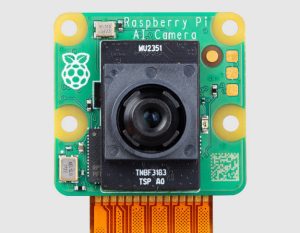Alongside the image sensor is a RP2040 microcontroller for neural network frame firmware, a DSP and ram, and together they can augment still or video images with tensor meta data for further processing on the host – running rpicam-apps or Picamera2.
“Support for tensor metadata in the libcamera and Picamera2 libraries, and
in the rpicam-apps application suite, make it easy for beginners to use, while offering
advanced users flexibility,” said Raspberry Pi.
Input tensors can be 640 x 640, and in int8 or uint8 formats.
The module comes pre-loaded with MobileNetSSD.
Sensor modes include 4,056 x 3,040 10bit at 10frame/s or 2,028 x 1,520 at 40frame/s, and it has 1.55 x 1.55μm pixels.
Dimensions are 7.8mm (‘1/2.3’) for the sensor and 25 x 24 x 11.9mm for the module – the latter the same footprint and mounting holes as the company’s Camera Module 3, but taller to accommodate the lens, which manually-focuses over 200mm to infinity.

